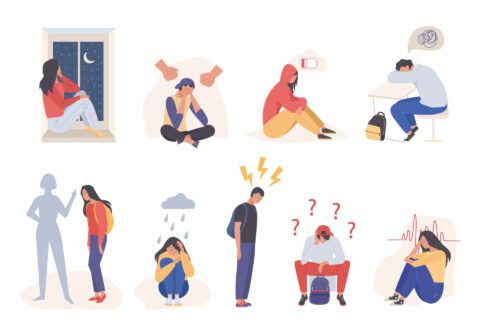Our Blog Posts

More Than One Loss Grief is often thought of as the pain we feel after losing a loved one. But grief isn’t just about the person who died —it’s also about everything that went with them. The routines you shared, the roles you played, the future you imagined, and even the relationships that shift in the aftermath. These are known as secondary losses, and they can be just as difficult as the primary loss itself. Secondary losses are often not antcipated. You might expect to grieve your loved one, but you may not anticipate the deep loneliness that comes from losing the small daily interactions you had with them. You might feel the pain of losing not just a spouse, parent, or friend, but also the identity that came with being their partner, caregiver, or confidant. These hidden losses can make grief feel even heavier, and understanding them can help you navigate this challenging time. What Are Secondary Losses? Grief touches every part of life, which means secondary losses can take many forms. Some of the most common include: · Loss of roles: If you were a caregiver, a partner, or a child who looked to a parent for guidance, that role is now different—or gone entirely. Adjusting to life without that identity can feel disorienting and painful. · Loss of routines: Grief often disrupts the everyday patterns of life. The morning coffee you always shared, the Sunday phone calls, the daily check-ins—small but meaningful aspect of our lives. · Loss of relationships: Some friendships and family connections change after a loss. People may not know how to support you, or they may distance themselves. Others may expect you to grieve on their timeline, making it harder to maintain those relationships. · Loss of security: This could be financial, especially if the person who died contributed to household income. It could also be emotional—the feeling that you had a safe and predictable life before this loss. · Loss of future plans: Every loss changes the future. Dreams you shared, trips you planned, milestones you expected to celebrate together—these losses can hit unexpectedly, sometimes long after the initial grief has subsided. The Emotional Impact of Secondary Losses Secondary losses can feel like waves that keep coming, even when you think you’ve found solid ground. Because they are not always acknowledged by others, they can feel isolating. But just like the primary loss, they deserve space and recognition. Navigating Secondary Losses: Practical Advice · Name and validate the losses. It may help to make a list of the secondary losses you’re experiencing. Acknowledging them can bring clarity and help you acknowledge the many losses you have. · Create new routines and roles. While the old ones may never be replaced, finding small ways to establish new patterns can bring a sense of stability. This could be as simple as a new morning ritual or a different way of honoring your loved one’s memory. · Seek out supportive relationships. Some connections may change, but new ones can also emerge. Finding people who understand grief—whether through support groups, therapy, or trusted friends—can help ease the loneliness. · Give yourself permission to grieve these losses. Just because they aren’t always talked about doesn’t mean they aren’t real. Allow yourself to mourn what has changed, just as you mourn the person you lost. · Consider professional support. If secondary losses feel overwhelming or make it difficult to function, a grief counselor can help you process them and find ways to cope. Grief Is Layered, But Healing Is Possible Grief is never just about one loss. It’s about all the pieces of life that shift and change in the wake of that loss. If you find yourself grieving things beyond the person who died, know that you are not alone. Be patient with yourself as you navigate these changes, and remember that support is available when you need it.

Written by Memorial Mortuary & Cemeteries in-house Grief Counselor, Amanda Nelsen As a grief therapist, I have found that people who have, or are able to create, a support network for themselves after a death of a loved one seem to have better outcomes in their grief overall. It can be key to helping yourself through the dark days. Below are some ideas to help you start or grow your own network. 1. Grief is isolating and connection is healing. Often we isolate ourselves when we are experiencing a lot of pain from grief. Many people will find a natural support network among their friends and family. Allow yourself to open up to those closest to you, even if it feels uncomfortable and not natural at first. 2. Groups and professionals. In addition to connecting with those you know and love, it can also be helpful to connect with a support group of others who are also navigating their grief. Support groups can provide a sense of community and understanding that you may not have with those already in your life. In addition, a professional, like a therapist or social worker, may also provide a safe space for you to explore your emotions and navigate the challenges of grief. 3. Acknowledge and express your emotions. There are a LOT of emotions that come with grief. Anger, sadness, shame, guilt, joy, relief, irritation, numbness, and so much more. Allow yourself to express and process all those emotions – and when you are ready, share them with those around you. It’s hard for others to support you if they don’t know what you are going through. 4. Express your needs clearly. Communication is key when you are building your support network. Your loved ones can’t help you if they don’t know what you want from them. Of course, this can be complicated when we aren’t even sure what we need or want, but even letting others know that YOU don’t know can be helpful. 5. Have flexibility and patience - with yourself and others. As you’ve probably discovered, grieving is very individual and everyone grieves at their own pace. People in your network will all be grieving differently. Holding space for compassion and understanding for them (and yourself) will be essential. 6. Share memories and create new traditions together. You might want to ask your support system to help you create a scrapbook, or organize a memorial event, or find other rituals that hold meaning to you. Having shared experiences strengthens your connection with others who also might be grieving. 7. Find ways to GIVE support. Many times when we are grieving we find it hard to think about others, because we are so full of pain ourselves or are just focused on surviving the next day. But when we find some space to help others, we usually find some healing. It might not seem like much, but dropping off a meal or a sending a text can really uplift someone else. 8. Setting boundaries within your support system. While support and connection are vital to grief, setting healthy boundaries is also important. You might want to keep certain memorial rituals to yourself, or carve out alone time. You may need specific types of support (and not want others). And this all might change over time. Check in with yourself regularly to figure out what boundaries are healthy for you, and then communicate them clearly to those around you. 9. Acknowledge and celebrate resilience and growth. Grief is about loss, but it can also be about resilience and growth. Find ways to celebrate the small moments with your support network. Share stories of strength and survival. Make healing a collaborative process – we can find solace in the journey of remembering our loved ones. If you feel like you could use extra support with your grief, please reach out to Amanda Nelsen Amanda.Nelsen@MemorialUtah.com.

Life takes us on many adventures. None more mysterious than when we leave this world. There is sadness, for sure. And there is probably a feeling of not having accomplished enough. Some cultures believe we fly away on gossamer wings. Others that we never really leave but remain to protect or pester our loved ones. Some believe we simply become part of the earth. Many of us believe there is something waiting for us, along with a few duties and the ability to watch over those we left behind. These beliefs can sometimes intensify feelings of responsibility to our families before we go. There are the logistics that nag us: how is the funeral paid for? Who will speak? Who can I politely ask not to speak? Where will I be laid to rest? And do we really need to have bagpipes? Once these are taken care of, we can focus on the relationships we value the most. Time is the one commodity we can never seem to get enough of. Being prepared frees up our minds and hearts to make use of the time we have. There is only so much time. And whether we fly away on wings when we die or get to sit unnoticed at a grandchild’s recital, knowing your loved ones don’t have to stress out over your funeral or find a way to pay for it is the best gift you can give them, and yourself. If you’ve already pre-planned your funeral and cemetery needs, then you know exactly this feeling of peace of mind. If you haven’t pre-planned yet, please don’t hesitate to reach out to us at. We are here to help guide you and ensure that all of your needs are taken care.

Written by Memorial Mortuary & Cemeteries in-house Grief Counselor, Amanda Nelsen Technology and Grief Grief often changes our whole world – and the digital age has brought about a whole new dimension of grief. Mourning used to be more intimate – something that was done with a small group of family or friends and typically in person. Now our grief experience can play out on the public stage of social media, online communities, and virtual memorials. Below we will highlight a few of the unique challenges and unexpected opportunities that come with navigating grief in our tech-connected world. The Social Media Dilemma In the digital era, it's become customary to share our lives online, but when it comes to grief, the lines blur. Condolences come in the form of likes and comments, leaving us to grapple with the question: Is a virtual hug as comforting as a real one? The struggle to balance the genuine support from our online circles with the sometimes superficial nature of digital interactions is real. We can be surrounded by digital support, but still feel quite alone in our grief day-to-day. Online Communities One beneficial aspect of grieving in the digital age is the emergence of online communities that offer comfort and understanding. Whether it's a forum, a Facebook group, or a subreddit, these virtual spaces have become very popular over the past couple decades. The ability to connect with others who have walked a similar path can be a lifeline in times of isolation. They can be especially helpful when you feel you have a unique grief/situation and are having a hard time finding people around you who have been through a similar situation. The Echo Chamber of Grief While online support can be a balm for the grieving soul, the digital echo chamber can also amplify the pain. Constant reminders of loss, triggered by algorithms and shared memories, can sometimes hinder the healing process. Striking a balance between staying connected and avoiding being overloaded can be difficult. Pressure to Post These days, when we are so connected, grieving in the public eye can sometimes feel like a performance. We might feel pressure to share our grief when we aren’t ready, or to put a positive spin on our grief when we aren’t feeling that way. We also may not want to share anything about our grief at all, which can also leave others feeling like we aren’t “properly” grieving. It can sometimes feel difficult to balance vulnerability and privacy. Embracing the Pros and Cons of Digital Grief In our hyperconnected world, grief weaves itself into many digital aspects of our lives. The challenges are real, but so are the opportunities for connection and understanding. As we navigate loss in the digital age, let's remember that grief is as unique as the internet – messy, unpredictable, and ultimately, a deeply human experience. So here's to finding comfort in the virtual hugs, solace in shared stories, and navigating grief in a world that's more connected than ever. If you feel like you could use extra support with your grief, please reach out to Amanda Nelsen Amanda.Nelsen@MemorialUtah.com.

Written by Memorial Mortuary & Cemeteries in-house Grief Counselor, Amanda Nelsen How can I get closure? This is a question I hear on a pretty regular basis. And I completely understand what is behind it – we want to be able to put the painful feelings of grief behind us. We want to be … Continued
The post Grief Integration appeared first on Memorial Mortuaries.

Written by Memorial Mortuary & Cemeteries in-house Grief Counselor, Amanda Nelsen The topic of regret has been on my mind recently. I often hear clients talk about the regrets they had after a loved one died – some become quite reflective on things they could have done differently or “better” while their loved one was … Continued
The post Regret appeared first on Memorial Mortuaries.

As a grief therapist, I have seen a lot of people grieving loved ones who died from Covid-19 over the past couple of years. A recent study has shown that people who have experienced the death of a loved one due to Covid-19, have increased mental health issues than a pre-pandemic death (Breen, … Continued
The post Navigating Grief During and After the Covid-19 Pandemic appeared first on Memorial Mortuaries.

We are grateful your family has chosen to entrust your loved one into our care. The recent COVID-19 pandemic has required us to enact some adjustments to how we conduct arrangement conferences, viewings, funeral or memorial services, and other aspects of our processes. Our goal is to allow you and your family to spend as … Continued
The post An Update regarding COVID-19 and its impacts on funeral, burial, and memorial services appeared first on Memorial Mortuaries.

Recently, an article came out highlighting the incredible relationship between a mother Orca and her baby calf, who passed away shortly after being born. The mother, Tahlequah, used her snout to keep her deceased calf afloat for 17 days and covered over 1,000 miles of ocean in the process, an unprecedented display of mourning … Continued
The post Why is a funeral so important? appeared first on Memorial Mortuaries.



